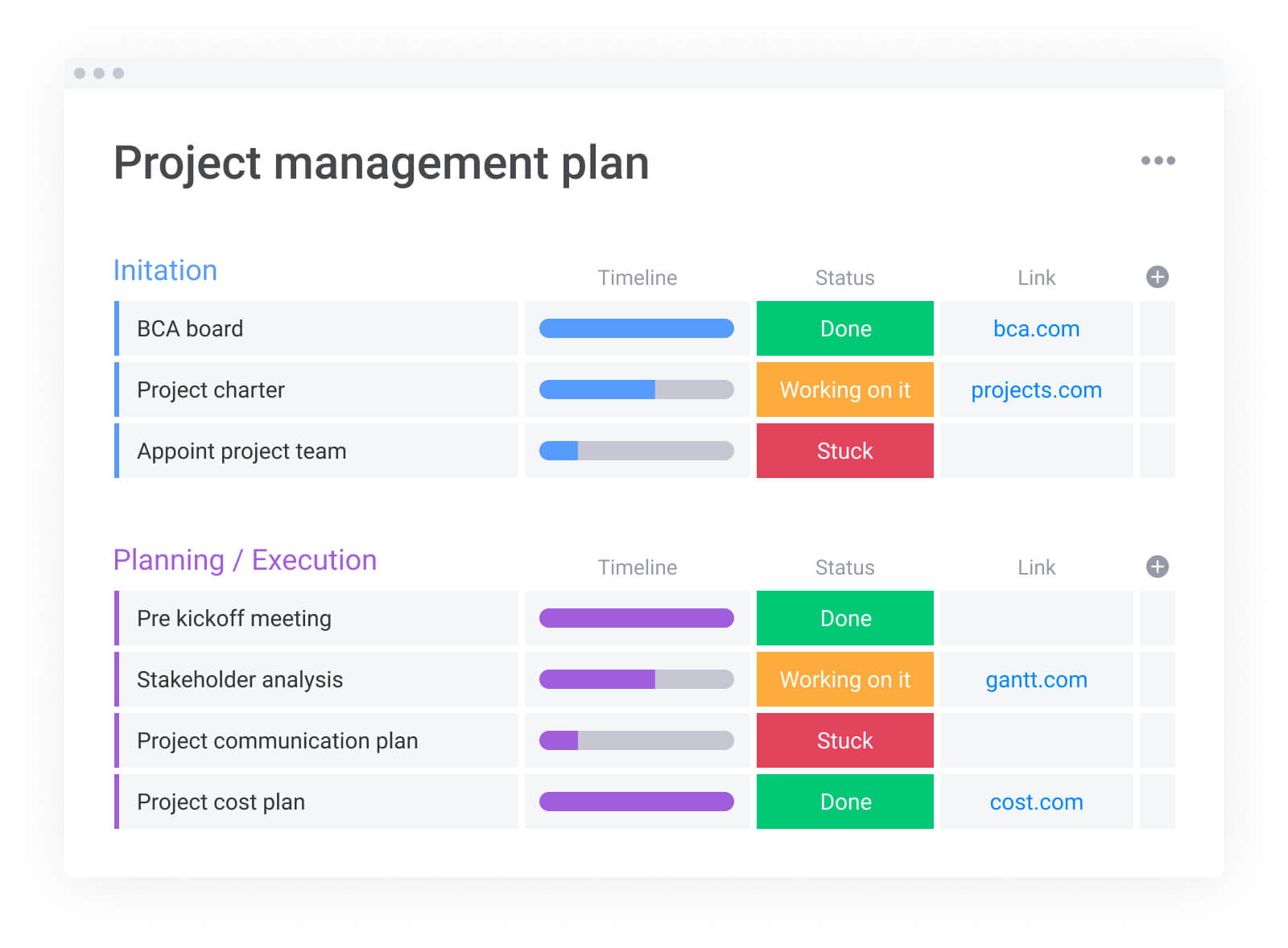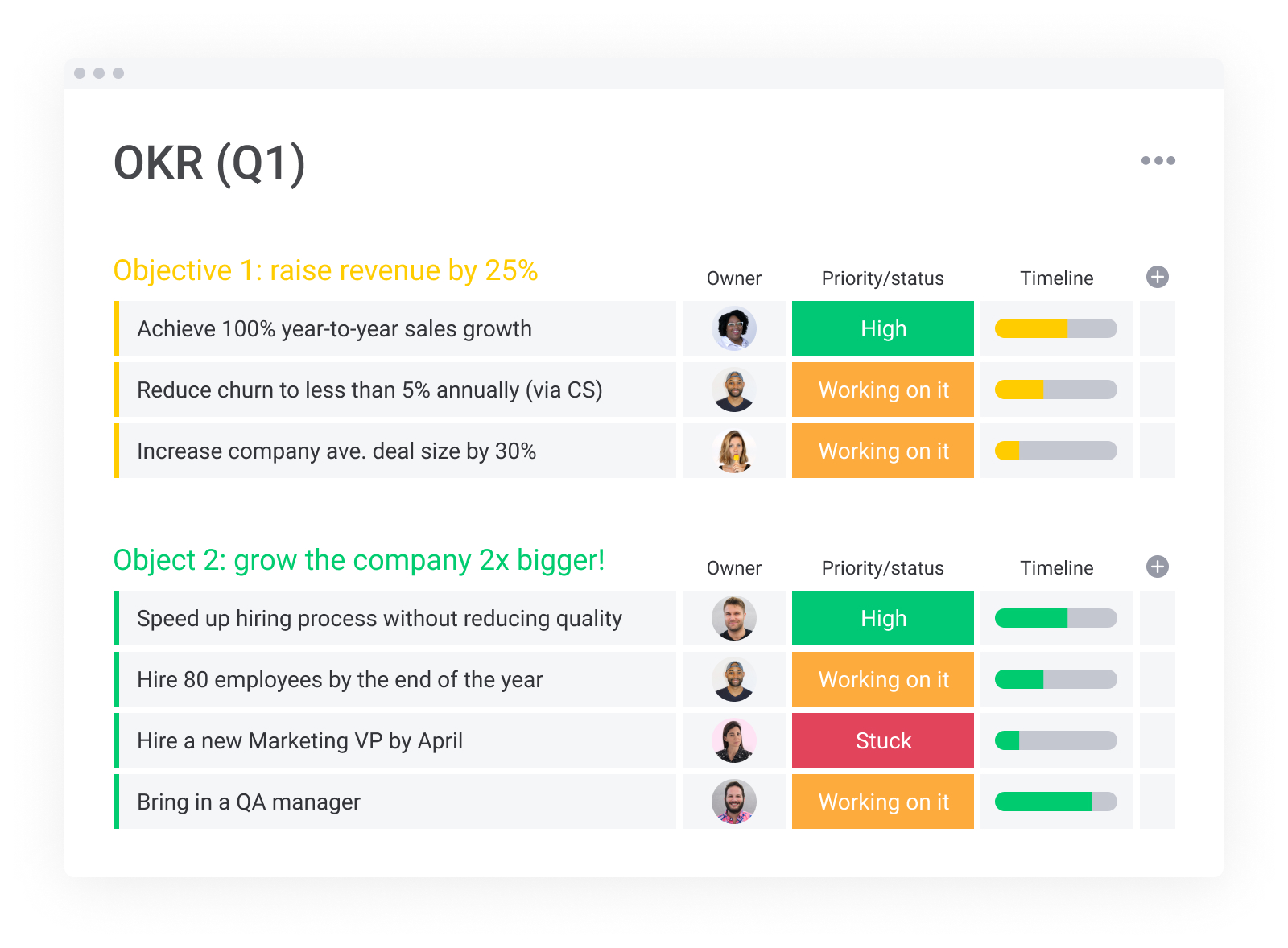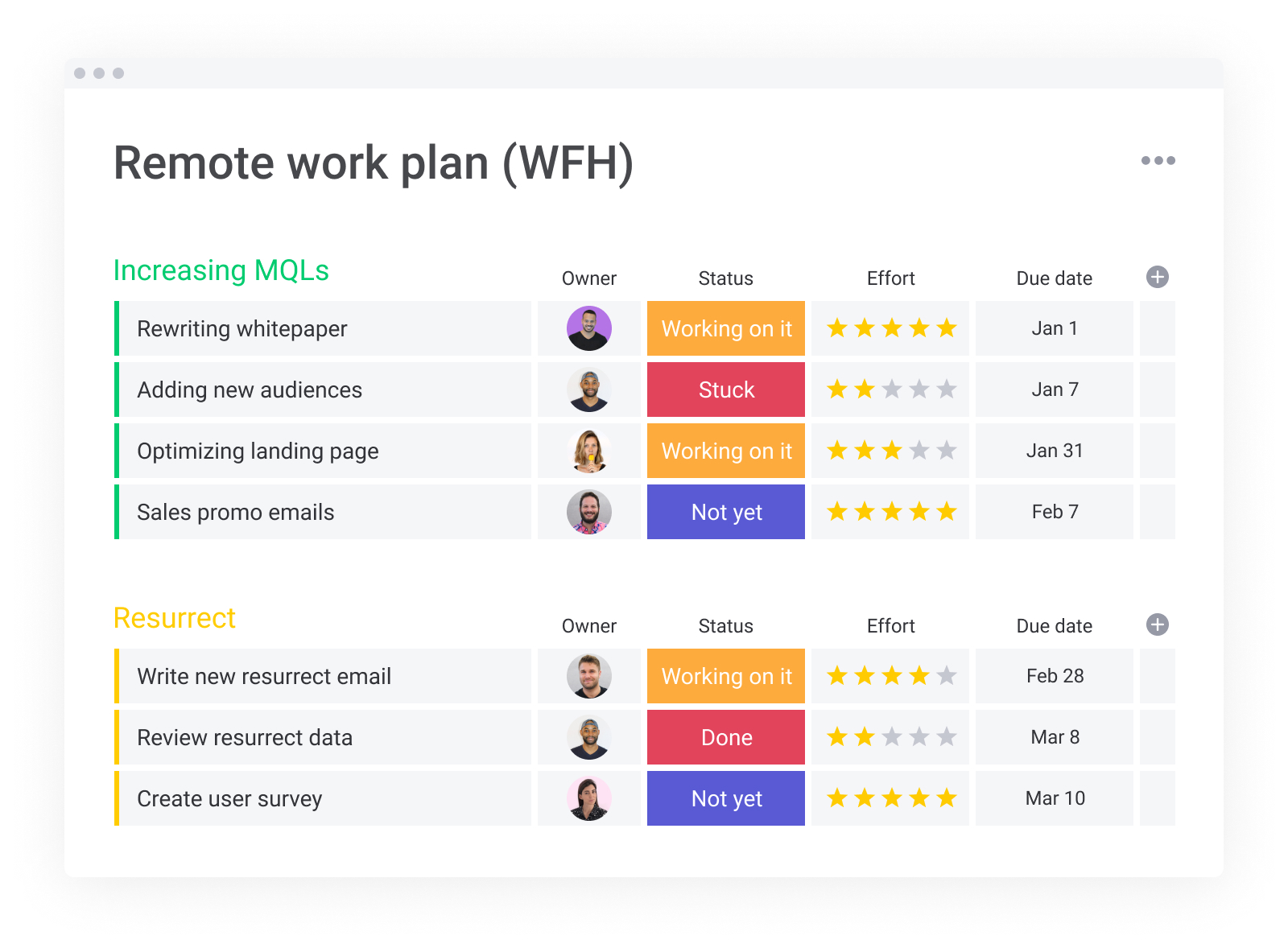Michael Jordan taught us the importance of team management: “talent wins games, but teamwork and intelligence win championships.”
Trying to go it alone rather than utilizing all the talents of a group of people rarely results in growth. That’s why effective team management is so important.
In this article, you’ll learn why team management is important, what a well-managed team looks like, how to develop better team management skills, and six tips for effective team management.
What is team management?
Team management is a manager’s ability to carry out and coordinate a team to execute their tasks and common goals. Team management usually involves a manager, a team, communication skills, active listeners, objective setting, creating a positive culture, and oftentimes a project management software to help everyone stay efficient and organized.
Efficient team management skills are crucial because they help employees feel more productive and motivated.
To effectively lead a team, we first need to establish what makes a successful team manager. We break down some of the necessities below.
What makes an excellent manager?
While there is no single metric or leadership skill that define a great team manager, there are several defining aspects of a well-working team that showcase strong leadership.
Successful management is when everyone has:
- A clear understanding of their own responsibilities
- A desire to achieve team and organizational goals
- Regular check-ins by managers and supervisors
An excellent manager also makes time to listen to and carry out employee feedback as needed, lead by example—whether that’s through showing a good work life balance or getting tasks done on time—and stay transparent on their own work challenges and how they’ll solve them.
Looking for more tips on what makes an excellent manager? Read our piece on the hidden skillsets of a senior manager.
Get startedWhy is effective team management important?
We’ve covered the traits of a manager, but why is their role and influence on the team important?
Aside from creating a positive work environment and making sure all team members are aligned to the team and organization’s goals, there are other benefits to the practice. Below, we break down three reasons why team management is important.
1. Team management can lead to happier employees
It’s part of a team leader or manager’s role to ensure employees feel good about where they work, as it can have a positive impact on the business’s success.
For example, when companies effectively manage teams and employees feel happy and valued, their market value and financial performance can increase, employee retention levels can rise, there’s often a higher-quality of customer service, and as a result, customers become more loyal.
To increase employee happiness, managers can:
- Encourage and then act on employee feedback – following through with acting on feedback shows team members that their voice matters.
- Prioritize work life balance – Overworked employees are in danger of burnout. Encourage employees to leave the office on time, or if the business allows, follow a more flexible work schedule, so employees can have more say over start and end times.
- Be transparent – openly communicate about mistakes, shortcomings, what you learned, results, and more with employees. Open communication goes a long way in making team members feel valued. Even sharing team management plans can provide meaningful context.
2. More productive employees
With effective team management, you can shape a culture where employees thrive. In a survey, 77% of US workers said culture has a strong impact on their ability to do their best work.
Proper team management can build a culture where workers can focus on their work rather than worry about external elements.Here are a few ways managers can shape the culture:
- Participate -by attending events, showing excitement for team progress, and connecting with employees on a personal level, team members will feel excited to contribute to team goals
- Recognize those for doing, not achieving –give recognition for completing tasks. Instead of waiting for the results of a task, give positive reinforcement and actionable feedback for completing it.
- Define goals together – Have open discussions about the company’s high level goals so they know what’s important and what’s not. Then, as a team, decide what’s worth focusing on and how to reach those goals together.
3. It can reduce employee turnover
In a 2019 survey, 81% of business owners said that “turnover was a costly problem.”
The survey reports that U.S. businesses spend $1.1 billion per year looking for replacement workers. It also reports that poor relationships between managers and colleagues is the second-most popular reason for employees resigning.
With this context, it becomes more evident that managers must focus on hiring the right people. We came up with few tips for choosing your next team member:
- Understand if they would fit in with your company culture – Before interviewing, understand what kind of person would best fit your culture or the culture you want to build. In the interview, ask questions related to the candidate’s values or interpersonal skills and assess whether they’d fit in well with your team.
- Hire slow – Take your time. Rushing to fill a vacant position may increase the chances of winding up with someone who isn’t a good fit. Be selective and wait for the right person.
- Have candidates meet team members – bringing in one or two team members to interview candidates will show whether they will mesh with the rest of your team and to spot potential red flags.
Now that we’ve gone over the benefits of team management, let’s discuss how you can successfully manage your team.
6 essential tips for effective team management
As we’ve outlined above, a good manager is an important part of a team’s success. They regularly keep the team motivated, on track, informed of company milestones and goals, and ensure everyone is satisfied and contributing towards the company’s bottom line.
Here’s are a few tips for how to effectively lead your team:
1. Communicate directly and transparently

Employees dread miscommunication because it causes confusion and stress. During 2019, 80% of surveyed US workers said they experienced stress because of ineffective or poor company communication.
Effective communication skills ensure team-wide clarity on tasks, deadlines, and goals. An example would include using collaboration features in a social media post scheduler that ensure clear communication during a social media content strategy. This transparency allows a team to focus on their productivity and collaboration.
On the flip side, poor digital communication management for teams lowers employee morale and productivity. This negatively impacts customer satisfaction and the bottom line.
A workplace platform, like staging-mondaycomblog.kinsta.cloud, can help managers and team members communicate better. For example, a manager can use a project communication plan for meetings, tasks, and progress reviews. Using this platform, managers can assign team members to action items and monitor their progress at every stage.
2. Offer a clear vision
In a study by Hypercontext, a majority of managers said that keeping their team on track to achieve goals was an important part of their role.
Managers who doesn’t have their eye on the ball, however, can’t ensure their employees move in the right direction.
Managers can often get side-tracked from their original goals by their own daily tasks and solving issues, big or small.
Setting a clear vision that highlights short-term and long-term goals for projects, teams, and the overall organization is arguably the best way for managers and employees to stay focused.
Managers can use team management software, such as staging-mondaycomblog.kinsta.cloud’s OKR (objectives and key results) template, to list and track goals. Templates can help maintain focus while also directing teams towards achieving their goals.

3. Encourage team collaboration
Employees who say they feel like part of a team are 2.3 times more likely to be engaged at work.
Effective collaboration is crucial for teams to get things done together, on time, and without conflicts.
To boost collaboration, managers can turn to collaboration software. In fact, using technology to run workflows and collaborative projects is almost expected; most Millennials (85%) and Gen Z (79%) workers say they want their direct managers to problem solve with technology, and this includes all of the tools needed to complete tasks and projects.
Platforms with a customizable project tracking template can help managers set-up projects. Everyone involved in the project can then track tasks, deadlines, and make changes quickly. For example, if you run your site on a hosting service such as WordPress, your team can benefit from a designated management platform to allocate different tasks, keep everyone informed of changes and updates, and stay accountable to the team’s KPIs. Because a platform such as WordPress is so vast and has a wide range of WordPress plugins to choose anything from creating a shop to a fully functioning Learning Management System, it is very easy for a small team to lose focus. That’s why it’s so important to rely on KPIs to stay on track and navigate your projects.

This transparent approach also enables employees to receive feedback and flag any issues immediately.
4. Delegate with care
A manager is expected to assign tasks to employees based on skill, experience, and competency. They must trust that every team member can complete assigned tasks on time.
Ideally, every team member should have a fair workload.
But even good managers can struggle with delegation. In fact, 21% of employees feel overwhelmed with their workload “most of the time.” A solution for this concern can be to use workflow automations.
A Gallup survey found an “unmanageable workload” is the second-leading that employees state for being burnt out.
How can managers ensure that they respect individual capacities?
Create an overview of task assignments for each team member and their deadlines.
A team task management template can help managers delegate tasks by easily identifying team members’ capacities and making changes to reduce heavy workloads.
5. Provide constructive feedback and recognition
Constructive feedback sessions provide insights into areas for improvement, both for employees and managers. It gives employees clarity on where they stand and where they are headed.
In Research by Reflektive, 92% of surveyed employees say they want more than an annual performance review. 72% of those surveyed want at least monthly review sessions.
When employees provide feedback, listen to what they’re saying and if possible, act on it. Changes inspired by these sessions can help employees, managers, and the team perform better and build trust.
Another critical aspect of feedback sessions is recognition.
Appreciation of team members’ efforts and achievements has a significant impact on employee morale, while a lack of recognition can lead to burnout.
A recent study states that a reduction of providing and receiving recognition increases the odds of burnout by 45% and 48%.
Scheduling feedback sessions while handling many other responsibilities can be challenging. One tool managers can utilize for easy feedback scheduling and managing is a feedback tracker, like the one below.
6. Overcome remote work challenges
It’s estimated that by the end of 2021, 25-30% of the US workforce will work from home more than once a week.
To handle a remote team, managers must identify and solve the challenges of hiring and managing virtual team members.
Some common challenges include scheduling and miscommunication. To overcome these roadblocks, managers can record all information—from new hires to team activities—on a remote work plan template.

Managers can even use this template as a way to organize remote workers’ feedback. Research shows that remote employees who received feedback in the past week were 4.6 times more likely to be engaged with the team.
Effective team management helps the whole company run more smoothly
Effective team management is essential for both team and organizational success.
A manager who excels in fundamental areas—such as setting goals, delegating tasks, and providing consistent feedback—is more likely to have engaged employees, working towards the company’s goals. Your employees may be talented, but it’s effective team management that steers them in the right direction and helps them succeed.